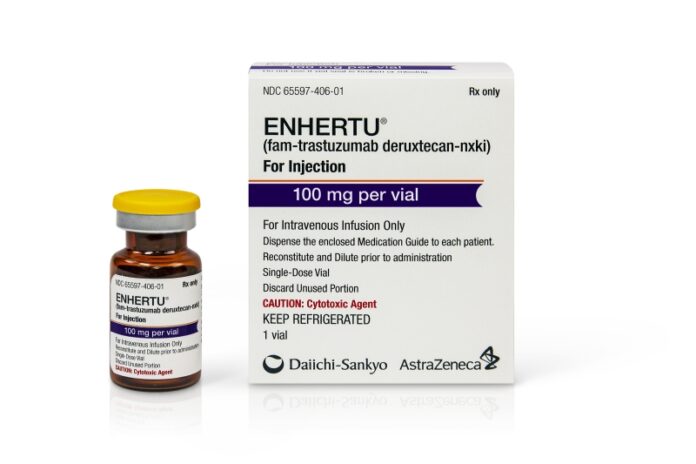May 7, 2025 — AstraZeneca and Daiichi Sankyo announced that their drug ENHERTU® (fam-trastuzumab deruxtecan-nxki), followed by a combination of paclitaxel, trastuzumab, and pertuzumab (THP), significantly improved pathologic complete response (pCR) rates in patients with high-risk, early-stage HER2-positive breast cancer, according to topline results from the Phase III DESTINY-Breast11 trial.
The study marks the first time a Phase III trial has shown clinical benefit for ENHERTU in early breast cancer, extending its potential use beyond the metastatic setting. In the neoadjuvant setting—treatment given before surgery—patients treated with ENHERTU followed by THP had significantly higher pCR rates compared to those who received the current standard regimen of dose-dense doxorubicin and cyclophosphamide followed by THP (ddAC-THP). pCR is a key early indicator of long-term treatment success and is defined as the absence of invasive cancer cells in breast and lymph node tissue post-treatment.
Though data on event-free survival (EFS), a secondary endpoint, remain immature, early findings suggest a favorable trend for ENHERTU. The study will continue to monitor EFS outcomes.
An estimated one-third of early-stage breast cancer patients are considered high-risk and face a greater likelihood of disease recurrence. Existing chemotherapy regimens in this setting often involve anthracyclines, which carry significant long-term side effects and fail to achieve pCR in nearly half of patients.
“The clinically meaningful improvement in pathologic complete response and the safety data seen in DESTINY-Breast11 highlight the potential of ENHERTU to challenge the current standard of care,” said Dr. Susan Galbraith, Executive Vice President of Oncology R&D at AstraZeneca. “These data support advancing ENHERTU into earlier stages of disease where cure is possible.”
Dr. Ken Takeshita, Global Head of R&D at Daiichi Sankyo, added, “These topline results demonstrate that ENHERTU followed by THP could offer patients with HER2-positive breast cancer a promising new treatment approach prior to surgery.”
In addition to efficacy, the ENHERTU-THP regimen showed a better safety profile than the standard ddAC-THP treatment. No new safety concerns emerged, and rates of interstitial lung disease were consistent between the two groups, as confirmed by an independent review committee.
Patient enrollment in a third trial arm testing ENHERTU alone was halted after an earlier interim review, following a recommendation from the Independent Data Monitoring Committee.
Full trial results will be presented at an upcoming medical conference and submitted to global regulatory agencies for potential label expansion.
ENHERTU is a HER2-targeted antibody drug conjugate developed by Daiichi Sankyo and jointly commercialized with AstraZeneca. It is currently approved for various HER2-positive breast cancer indications and is being tested in multiple ongoing trials, including the high-risk adjuvant setting in DESTINY-Breast05.


